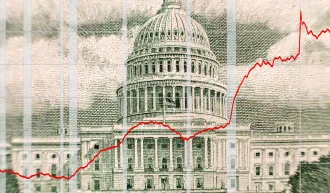November 15, 2017
| by Edmund AndrewsFive years ago, Congress passed the JOBS Act, which allows companies that go public to disclose less information about executive pay, financial performance, and other issues.
The idea was to cut red tape and make it easier for “emerging growth companies” — actually, any company with less than $1 billion in sales — to raise serious money and jump into the big leagues.
It’s not clear what the law did for jobs, but a new study finds that it did benefit two key groups: well-paid company managers and well-connected institutional investors.
The study, by Mary Barth at Stanford Graduate School of Business — together with Wayne Landsman at the University of North Carolina’s Kenan-Flagler Business School and Daniel J. Taylor at the Wharton School of Business at the University of Pennsylvania — also finds that the reduced disclosure requirements created investor uncertainty — and they responded by paying less for the shares.
In fact, that reduction in transparency cost the companies as well. On an apples-to-apples basis, investors underpriced JOBS Act initial public offerings, or IPOs, by an average of 7%. That translated to about $10 million less in proceeds per company. Thirty days after the public offering, the underpricing had widened to almost 13%, or $18 million in market value.
What that tells you, says Barth, is that the new law is depriving investors of information they consider relevant. The most important (but not only) area of reduced transparency: executive pay.
“Reducing requirements for disclosures can be beneficial if investors don’t need the information,” acknowledges Barth, the Joan E. Horngren Professor of Accounting at Stanford GSB. “But our paper says that’s not what’s going on. The information that companies are choosing not to disclose is information that investors would like to have. And because they don’t have it, they are paying less for the firm and the stocks are trading with more volatility.”
Perhaps more surprising, the researchers also found that the reduced transparency tipped the playing field against ordinary investors. After the JOBS Act took hold, a particular class of well-sourced institutional investors bought up a measurably higher proportion of the shares sold through initial public offerings.
These “dedicated” institutional investors — defined as institutions that take big stakes in particular companies and have low portfolio turnover — have long been shown to have more access to private information than ordinary investors. That gives them an information advantage, which becomes bigger when companies are allowed to provide less information to the public at large.
Under previous law, for example, a company was required to include detailed information in its prospectus about salary, stock options, and other compensation for its five most highly paid executives. They also had to provide a discussion and analysis of that pay.
Under the new law, companies only have to provide pay information for two executives and don’t have to provide any explanations. Looking at initial public offerings that qualified under the JOBS Act in 2012 and 2013, the researchers found that 84% of them disclosed the pay of fewer than five executives and that 87% provided no discussion and analysis about compensation.
The new law reduced a number of other requirements as well. One big one: Companies no longer had to make public their draft registrations — the early draft prospectuses that they submit to the Securities and Exchange Commission.
That’s important, says Barth, because public availability of the draft registrations give investors much more time to digest the nuances of a company’s business. Under the JOBS Act, however, a company only has to release a draft prospectus 21 days before the IPO roadshow.
Then there’s the issue of disclosing past financial performance. Where the old law required companies to provide three years of audited financial statements, the new one requires only two years. The new law also exempts “emerging growth companies” from Sarbanes-Oxley disclosures, which are aimed at preventing Enron-style accounting abuses.
Examining the Data
The researchers compared the practices and the valuations of 158 companies that went public within 18 months after the law took effect with those of 218 companies that would have qualified but went public before the JOBS Act became law.
To make valid comparisons, the researchers adjusted for a long list of variables that can affect valuation. These included not just a company’s size, revenues, and profitability, but also its industry, ownership structure, the quality of its auditors, the reputation of underwriters, and the degree of venture capital support.
The vast majority of companies did indeed reduce their disclosures, especially about executive compensation but also in a number of other areas, including confidentially filing with the SEC their draft registration statement, delaying compliance with the SOX requirement related to auditor attestation of internal control audits, reducing the scope of financial statement information, and delaying the application of new or revised accounting standards.
Investors displayed their increased uncertainty in several ways. First, they underpriced shares both on the day of the public offering and even more in the month that followed. Second, they were clearly jittery: The volatility in post-IPO trading was about 12% higher, and the spread between bid and ask prices was wider.
The biggest driver of the underpricing, in large part because it was the most frequent area of reduced transparency, appears to have been the reduced disclosures about executive pay.
Barth says top company executives benefit from this in several ways. The most obvious is in avoiding public scrutiny and criticism of generous pay packages. In addition, however, senior executives may also perversely benefit from a lower stock price at the public offering. That’s because the profit from stock options usually depends on how much the stock goes up from its offering price. A depressed price at the start can mean bigger gains later on.
“It’s a deadweight loss,” says Barth. “It isn’t good for either the company, which receives lower proceeds from the stock offering, or for the shareholders.”
To be sure, Barth and her colleagues also found evidence that companies can have good reasons for limiting disclosures before a public offering. Companies often worry that revealing certain kinds of proprietary information, such as licensing and royalty agreements, or contracts with suppliers, can undermine their competitive advantage.
Indeed, many companies apparently tried to compensate for their initially reduced transparency by volunteering additional information after the IPO more often than firms that went public before the JOBS Act. Even so, says Barth, that leaves investors with heightened uncertainty for several months.
As it happens, the JOBS Act could soon have a broader impact. The Securities and Exchange Commission is currently considering whether to expand the relaxed disclosure rules to all stock offerings for companies of all sizes.
Does the new study make Barth skeptical about the benefits of the JOBS Act? “More skeptical than before,” she says.
For media inquiries, visit the Newsroom.





